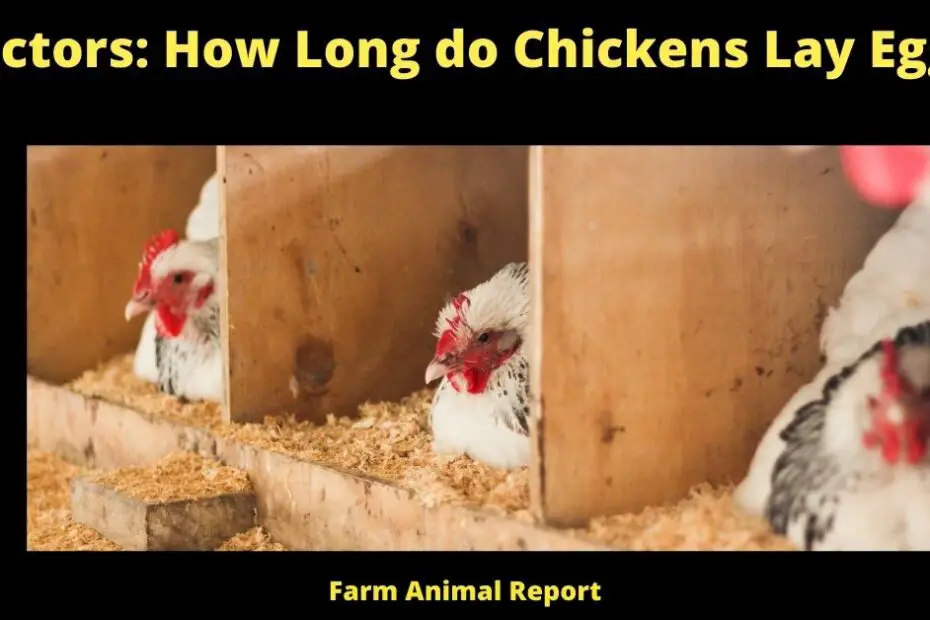There’s a lot of confusion about how long chickens lay eggs. Some people think they lay eggs for their entire lives, while others believe that there is a specific time period during which they lay eggs. So, what’s the truth? How long do chickens lay eggs? Surprisingly, the answer isn’t as straightforward as you might think. In this blog post, we will explore the various factors that play into egg production and answer the question once and for all!
How Long do Chickens Lay Eggs?
Chickens are prolific egg-layers, and will usually lay an egg every day or two. However, there are several factors that can affect how many eggs a chicken lays. Age is one factor – younger chickens will usually lay more eggs than older chickens.
Seasonality is also a factor – chickens tend to lay fewer eggs in the winter than in the summer.
Diet can also influence egg production – chickens that are well-fed and have access to plenty of fresh water will usually lay more eggs than those that do not. Finally, stress can also affect a chicken’s ability to lay eggs.
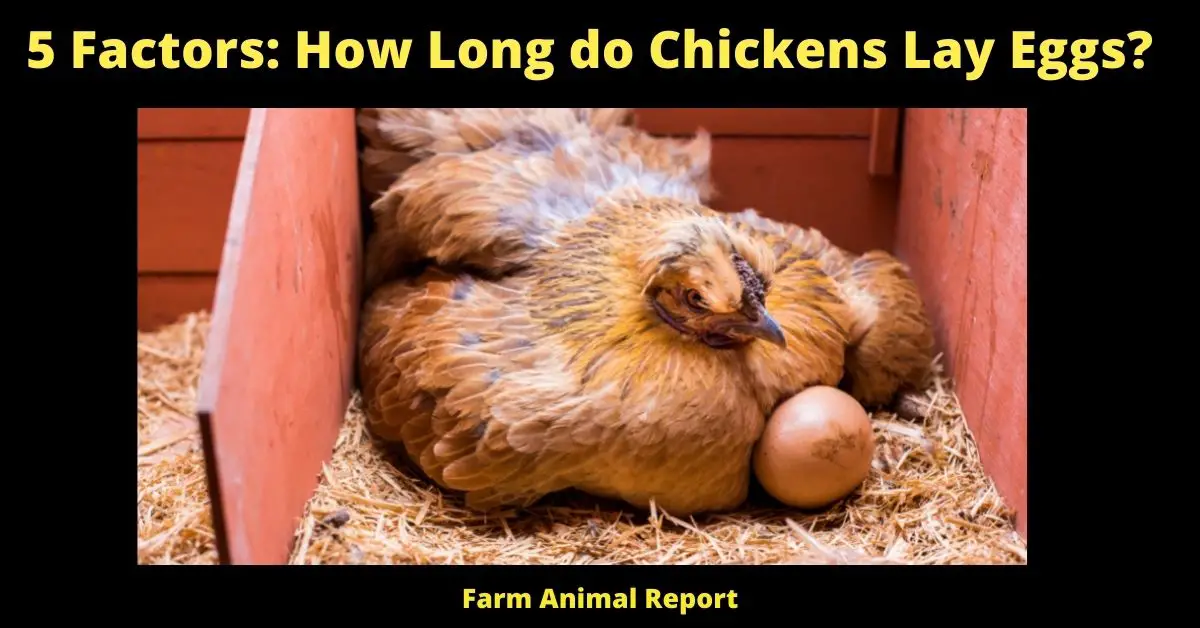
Chickens that are nervous or anxious will often stop laying eggs altogether. For all of these reasons, it is difficult to give a definitive answer as to how long chickens will lay eggs. However, with proper care and management, most chickens will lay eggs for several years.
What Factors Determine How Long Chickens Lay Eggs for?
Chickens typically begin laying eggs when they are around 16 weeks old and will continue to lay eggs for the next 2-3 years. However, there are a number of factors that can affect how long chickens lay eggs.
For example, changes in day length can trigger hens to stop laying eggs. Hens also tend to lay fewer eggs during times of stress, such as when they are molting or experiencing illness. In addition, older hens typically lay fewer eggs than younger hens. As a result, there is no one answer to the question of how long chickens lay eggs. Instead, it depends on a variety of individual factors.
Does egg Production relate to The age of the chicken?
Egg production in chickens is directly related to the age of the chicken. Egg production declines as the chicken ages and reaches its peak when the chicken is between 18 and 24 months old. After that, egg production gradually declines until it stops altogether.
The decline in egg production is caused by a number of factors, including changes in the structure of the ovaries and a decrease in the number of follicles. Additionally, older chickens are less likely to be bred, which also contributes to a decline in egg production. Ultimately, egg production is directly linked to the age of the chicken, with younger chickens producing more eggs than older birds.
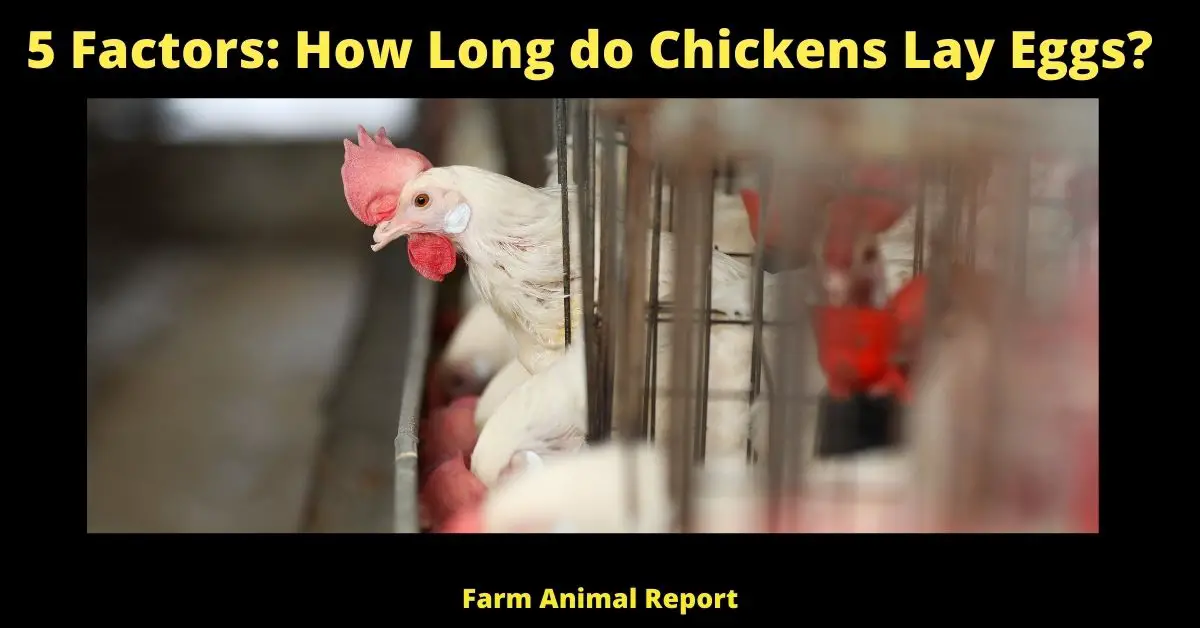
What are Chicken Laying Cycles?
In order to understand chicken laying cycles, we must first understand chicken reproductive anatomy. The ovary of a chicken is located near the kidney and is attached to the oviduct. The oviduct is a long, coiled tube that leads from the ovary to the cloaca, which is the common opening for the digestive, urinary, and reproductive tracts. Chickens have two ovaries, but only the left ovary develops fully.
Egg production begins when a chicken reaches sexual maturity, which occurs between 18 and 24 weeks of age. During each cycle, an egg travels from the ovary through the oviduct and is deposited in the cloaca. The entire process takes about 26 hours. A chicken can lay one egg per day, but the number of eggs produced will vary depending on the breed, age, nutrition, and health of the chicken.
The length of a chicken’s laying cycle also varies depending on these factors. Most chickens will lay eggs for about six months before taking a break for molting or molting (losing feathers and growing new ones). After molting, chickens usually resume laying eggs at a reduced rate. Some breeds of chickens can lay eggs almost continuously throughout their lives.
Family Sized Chicken Farm Egg Calculator
| Number of Chickens | Number of Eggs / Day | Number of Eggs / Week | Number of Eggs / Month | Number of Eggs / Year | Family Size | $ Value = .30 / Egg |
|---|---|---|---|---|---|---|
| 1 | .5 | 3.5 | 24 | 168 | 50.40 | |
| 2 | 1 | 7 | 28 | 336 | 1 | 100.80 |
| 3 | 1.5 | 10.5 | 42 | 504 | 151.20 | |
| 4 | 2 | 14 | 56 | 672 | 2 | 201.60 |
| 5 | 2.5 | 17.5 | 70 | 840 | 252.00 | |
| 6 | 3 | 21 | 84 | 1008 | 3 | 302.40 |
| 7 | 3.5 | 24.5 | 98 | 1176 | 352.80 | |
| 8 | 4 | 28 | 112 | 1344 | 4 | 403.20 |
| 9 | 4.5 | 31.5 | 126 | 1512 | 453.60 | |
| 10 | 5 | 35 | 140 | 1680 | 5 | 504.00 |
| 11 | 5.5 | 38.5 | 154 | 1848 | 554.40 | |
| 12 | 6 | 42 | 168 | 2016 | 6 | 604.80 |
| 13 | 6.5 | 45.5 | 182 | 2184 | 655.20 | |
| 14 | 7 | 49 | 196 | 2352 | 8 | 705.60 |
| 15 | 7.5 | 52.5 | 210 | 2520 | 756.00 | |
| 25 | 12.5 | 87.5 | 350 | 4200 | 1260.00 | |
| 50 | 25 | 175 | 700 | 8400 | 2520.00 | |
| 75 | 37.50 | 262.5 | 1050 | 12600 | 3780.00 | |
| 100 | 50 | 350 | 1400 | 16800 | 5040.00 |
Per Day / Per Week / Per Month / Per Year / Dollar Value
Chicken laying cycles are determined by the amount of daylight that the chicken is exposed to. Chickens are classified as being photoreceptive, meaning that they are sensitive to changes in light. In the wild, chickens would experience longer days in the summer and shorter days in the winter.
This change in daylight exposure would trigger different hormonal changes within the chicken, resulting in different laying cycles. However, most domesticated chickens are kept in environments with a constant level of light exposure.
As a result, their hormones remain relatively stable and they lay eggs throughout the year. While some commercial operations use artificial lighting to simulate different seasons, most backyard chicken keepers simply allow their chickens to follow their natural instincts.
How does Molting Affect Egg Production?
Molting is the process where chickens shed their old feathers and grow new ones. The entire process takes around 6-8 weeks, and during this time, egg production will usually decline. There are a few reasons for this. First of all, molting is a physically demanding process that requires a lot of energy.
As a result, chickens will often reduce their intake of food during this time in order to conserve energy. Additionally, the hormones responsible for egg production are also involved in the molting process. So, while a chicken is molting, its body is focused on growing new feathers rather than producing eggs.
For commercial egg producers, molting can be a significant issue as it results in a temporary drop in egg production. To overcome this, some producers use artificial lighting to trick chickens into thinking that winter is coming and trigger them to start molting. By doing this, they can control when molting occurs and minimize the impact on egg production.
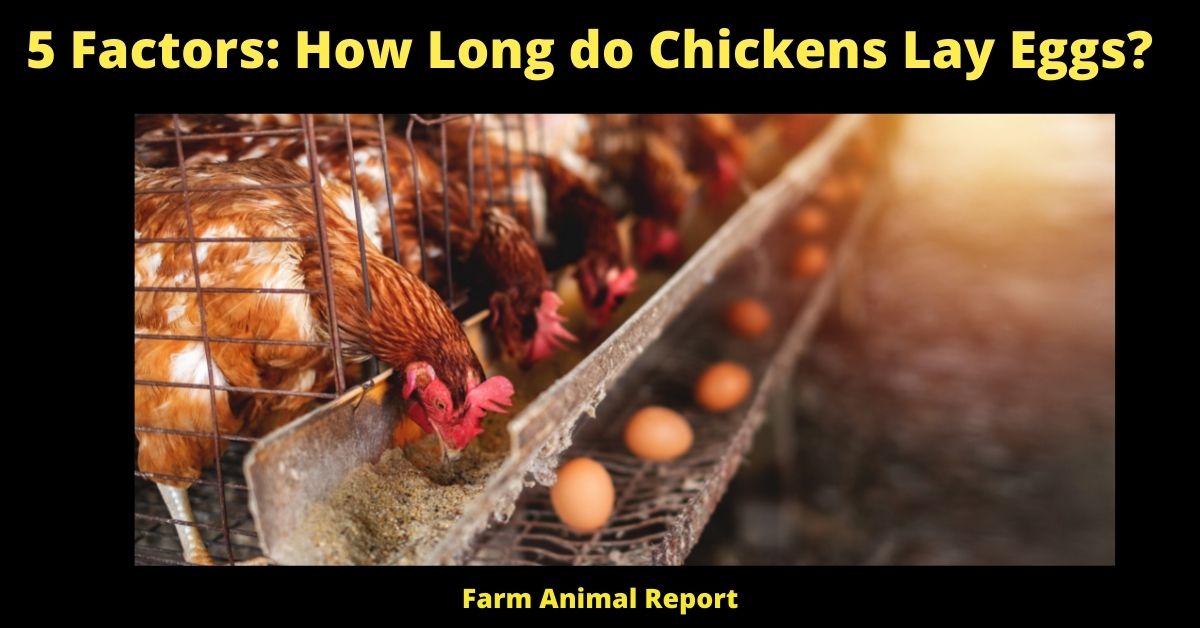
How does the Availability of Water affect Egg Production?
One of the most important factors in egg production is the availability of water. Chickens require a constant supply of fresh, clean water in order to stay healthy and produce eggs. Without enough water, chickens will become dehydrated and their egg production will suffer. In extreme cases, lack of water can even lead to death.
There are a number of different ways to provide chickens with water. One common method is to use an automatic waterer, which can be filled with fresh water on a regular basis. Another option is to provide chickens with a container of water that they can access at any time.
It is important to remember that chickens will not drink dirty water, so it is essential to keep their water source clean. By ensuring that chickens have a constant supply of fresh water, you can help them stay healthy and produce plenty of eggs.
How does Feed Affect Egg Laying Production?
Chickens require a well-balanced diet in order to produce healthy eggs. A typical diet for laying hens includes a combination of grains, protein, vitamins, and minerals. The type of feed can have a significant impact on egg production.
For example, hens that are fed a diet of pellets will typically lay more eggs than those that are fed a diet of scratch grain. Additionally, hens that are given access to plenty of fresh water will lay more eggs than those that do not have access to clean water. In general, the higher the quality of the feed, the higher the production of eggs.
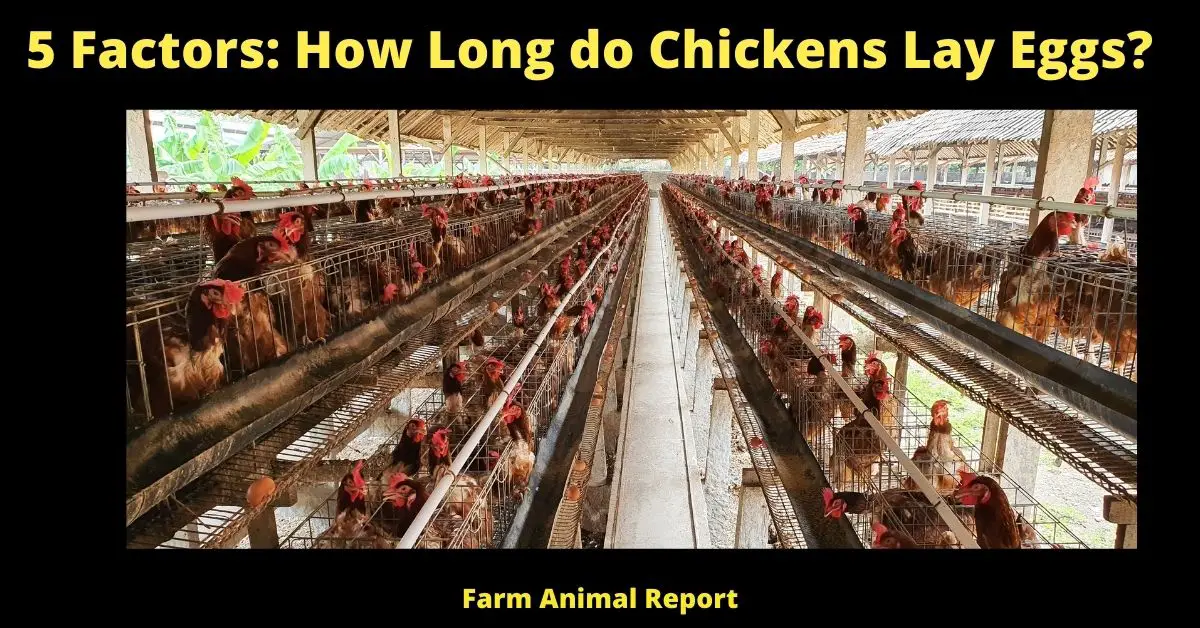
How does Lighting affect Egg Production?
A chicken’s egg production is affected by the length of the day or the amount of daylight. Chickens need 14-16 hours of light each day to maintain peak egg production. If they are exposed to less than 12 hours of light, their egg production will decline.
In the winter, when days are shorter, many farmers use artificial lighting to help their chickens maintain a high level of egg production. However, there is a trade-off to using artificial lighting. Chickens that are exposed to too much light can become stressed, which can lead to health problems and decreased egg production.
As a result, farmers must strike a balance between providing enough light for their chickens to lay eggs and not overloading them with too much light. The type of lighting used can also have an effect on egg production. Incandescent bulbs emit more heat than fluorescent bulbs, and this heat can cause stress in chickens and lead to reduced egg production.
Fluorescent bulbs are more expensive than incandescent bulbs, but they provide more consistent lighting and produce less heat, making them a better choice for chicken coops. By carefully considering the type of lighting they use, farmers can help ensure that their chickens lay eggs at a high rate.
How does the time of year affect egg production?
The time of year has a significant effect on egg production in chickens. In the spring and summer, when days are longer and there is more natural light, chickens tend to lay more eggs. Conversely, in the winter, when days are shorter and there is less natural light, the chicken’s egg-laying activity slows down.
There are a few possible explanations for this phenomenon. One theory is that longer days trigger increased hormone production in chickens, leading to more eggs being produced. Another possibility is that the warm weather of spring and summer provides ideal conditions for chickens to lay eggs, while the cold weather of winter makes it more difficult for them to do so.
Regardless of the reason, it is clear that the time of year has a significant impact on chicken’s egg-laying activity.
How Does The breed of chicken affect Egg Production?
Chicken breeds are selected for egg production based on a variety of factors, including egg size, shell quality, and the number of eggs produced per year. Some chicken breeds are better suited for industrial-scale egg production than others.
For example, the Rhode Island Red is a popular choice for commercial egg production due to its high egg output and good feed conversion ratio. Other chicken breeds, such as the Orpington and the Sussex, are typically used in smaller operations because they are better suited for free-range or backyard environments.
Regardless of the breed, all chickens need access to good quality food and clean water to produce healthy eggs. Additionally, chickens that are stressed or not well cared for are less likely to lay eggs regularly.
How does The environment in which the chicken lives affect egg production?
The environment in which chickens live can have a significant impact on egg production. Chickens that are confined to small spaces tend to produce fewer eggs than those that have access to larger areas. In addition, chickens that are kept in dirty or cramped conditions are also less likely to lay eggs.
Another factor that can affect egg production is the amount of daylight that chickens are exposed to. Chickens that are kept in dark or dimly lit conditions will typically lay fewer eggs than those that have access to plenty of sunlight.
Finally, the temperature of the chicken coop can also affect egg production. Chickens that are too hot or too cold will often stop laying eggs until the temperature returns to a more comfortable level. By providing chickens with a clean, spacious, and well-lit environment, poultry farmers can help ensure a higher level of egg production.
When do Chickens lay Eggs Day or Night?
Chickens typically lay their eggs during the day. However, there are some breeds that are known to lay their eggs at night. These include the Black Sumatra, Brahmas, and Cochin chickens. Chickens that lay at night often produce fewer eggs than those that lay during the day.
This is due to the fact that they have less time to forage for food and build up energy reserves. As a result, Night-laying chickens are usually only kept by hobbyists or those who are interested in having a unique chicken breed.
Types of Chicken Breeds
| Chicken Breeds | Origin | Meat/ Layers / Dual Purpose | Finished Weight | Eggs per Week | Weeks to Slaughter |
|---|---|---|---|---|---|
| Broilers | Canada/US/Europe | Meat | 3.3 lbs | 5 | 14 Weeks |
| Cornish crosses | England | Meat | 6.5 - 8.5 lbs | 3 | 8 - 9 Weeks |
| Jersey Giants | USA | Meat ( Intended to replace Turkeys) | 13 lbs | 4 | 8 - 9 Months |
| Hertigage Breeds | 6 - 9 months | ||||
| Delaware | USA Delaware | Duo | 6.5 lbs | 4 - large | 8 Months |
| Dorking | United Kingdom | Duo | 10 - 14 lbs | 5 - med | 5 Months |
| Buckeye | USA Ohio | Duo | 6 - 9 lbs | 4 - med | 5 Months |
| Rhode Island Red | USA Rhode Island | Duo | 6 b- 8 lbs | 5-6 | 5 Months |
| Leghorn | Italy | Eggs | 4 -5 lbs | 4 | 8 Months |
| Plymouth Rock | USA - Massachusetts | Duo | 7.5 lbs | 4 | 5 Months |
| Sussex | United Kingdom | Duo | 7 lbs | 4 - 5 - large | 5 Months |
| Wyandotte | Canada | Duo | 7 - 9 lbs | 5 Months | |
| Welsummer | Netherlands | Duo | 7 lbs | 4 / Week | 5 Months |
| Hamburg | United Kingdom | Eggs | 7 lb | 4 - med | 9 weeks |
| Black Australorp | Australia | Duo | \3 - 5 lb | 5 - med | 5 months |
| Buff Orpington | England | Duo | 7 - 8 Lbs | 4 - 5 | 8 months |
| Brahma | Meat | 11 lbs | 3 - med | 5 monthss |
Origin
Meat Breeds
Laying Breeds
Dual Purpose Breeds
Why do Chickens lay Eggs every Day?
Chickens lay eggs every day because they are able to produce more than one yolk per day. Each yolk is surrounded by albumen (egg white), and the whole egg is encased in a thin membrane called the chalaza.
The chalaza helps to keep the yolk centered in the egg, and also provides protection against bacteria. While chickens can technically lay an unlimited number of eggs, they will only do so if they have enough calcium in their diet. Without enough calcium, chickens will produce fewer eggs, and the eggs they do lay will be smaller and have thinner shells.
Additionally, hot weather can also affect a chicken’s ability to lay eggs. When it’s too hot, chickens’ bodies will divert calcium to their sweat glands in order to cool down, resulting in fewer eggs being laid. As a result, temperature plays a critical role in determining how many eggs a chicken lays.
How many Eggs do Chickens lay a Day?
Chickens are prolific egg layers, and the number of eggs they produce each day depends on a number of factors, including their age, diet, and breed. On average, a chicken will lay one to two eggs per day.
However, younger chickens typically lay fewer eggs than older chickens, and chickens that are fed a high-protein diet will usually lay more eggs than those that are not. Additionally, some chicken breeds are known for their egg-laying abilities.
For example, the Rhode Island Red is a popular choice for backyard chicken keepers because it can lay up to280 eggs per year. Whether you’re keeping chickens for egg production or as pets, you can expect them to lay a few eggs each day.
How often do Chickens lay Eggs?
Chickens typically lay one egg every 24-26 hours, although this can vary somewhat depending on the breed of chicken and the time of year. During the peak laying season, which is typically spring and summer, most chickens will lay an egg almost every day.
However, as the days get shorter in autumn and winter, egg production tends to slow down. Some chickens may stop laying eggs entirely during this time, although they will usually start up again in the spring. Given that chickens typically have a lifespan of 5-10 years, this means that a single chicken can lay thousands of eggs over the course of its lifetime.
How to get Chickens to lay eggs again?
Chickens will naturally stop laying eggs as the days get shorter and the weather gets colder. However, there are a few things you can do to encourage your chickens to lay eggs year-round. First, make sure they have plenty of food and water.
A chicken’s laying cycle is strongly influenced by its nutritional intake, so a healthy diet is essential. Second, provide your chickens with a comfortable place to nest. A cozy nest box will help to ensure that your chickens feel safe and secure, both of which are important for egg production. Finally, keep your coop well-ventilated and free from drafts.
Extreme temperatures can also interfere with a chicken’s laying cycle, so it’s important to provide a consistent environment. By taking these simple steps, you can help your chickens stay productive even during the winter months.
How many eggs does a chicken lay in a week?
A chicken can lay anywhere from 0 to 280 eggs in a year, with an average of around 174 eggs being the norm. This works out to be roughly 3-5 eggs per week. However, it’s important to note that egg production can vary depending on a number of factors, such as age, breed, health, nutrition, and the time of year.
For example, younger chickens tend to lay more eggs than older ones, and certain breeds are known for their high egg production. In addition, stress and illness can affect a chicken’s ability to lay eggs, as can the amount of daylight they are exposed to. As a result, there is no definitive answer when it comes to how many eggs a chicken can lay in a week.
Why do Chickens stop Laying Eggs in Winter?
Chickens are a popular choice for raising at home due to their egg-laying abilities. However, many people are surprised to find that their chickens stop laying eggs in the winter months. There are a few reasons for this.
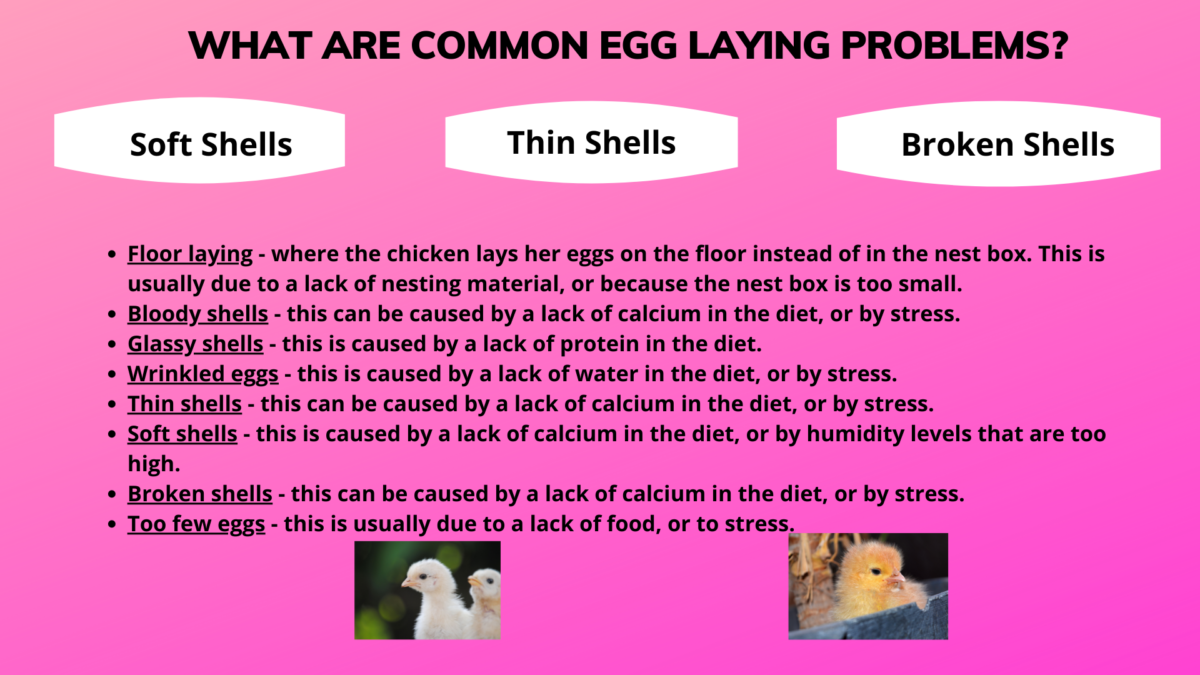
First of all, chickens require a certain amount of daylight in order to lay eggs. In the winter, there are fewer hours of daylight, which can throw off a chicken’s egg-laying cycle.
Additionally, cold weather can be tough on chickens, and they may stop laying eggs in order to conserve energy. Lastly, some chicken breeds are better equipped to handle cold weather than others, so if you live in a climate with severe winters, your chickens may need to take a break from laying until the weather warms up again. However, there are a few things you can do to help encourage your chickens to lay eggs even in the dead of winter.
Providing them with a source of artificial light, such as a heat lamp, can help extend the amount of daylight they receive each day. Additionally, making sure they have access to fresh water and plenty of food will help them stay healthy and active even in the coldest weather. By taking these steps, you can help your chickens continue to lay eggs year
How Many Eggs does a Chicken Lay per Year?
On average, a chicken will lay about 260 eggs per year. However, this number can vary depending on the breed of chicken as well as the age of the bird. For example, younger chickens tend to lay more eggs than older ones, and certain breeds are known for their high egg production.
For instance, Rhode Island Reds are a popular choice for egg farmers due to their ability to lay up to 300 eggs per year. Ultimately, the number of eggs a chicken lays in a year is determined by a variety of factors. However, with proper care and nutrition, most chickens will be able to produce a healthy number of eggs each year.
Final Thoughts – How Long do Chickens Lay eggs?
Chickens typically begin laying eggs around 18 weeks of age and will continue to lay eggs for approximately two years. After that, their egg production begins to decline. There are a number of factors that can affect how long chickens lay eggs.
First, the breed of chicken can impact egg-laying ability. Some chicken breeds are known for being good egg-layers, while others are not.
Second, the chicken’s diet plays a role in egg production. Chickens that are well-fed and have a balanced diet will lay more eggs than those that do not.
Third, the amount of daylight affects egg production. Chickens need 14-16 hours of daylight in order to lay eggs, so shorter days in the winter can lead to fewer eggs being laid.
Fourth, age impacts a chicken’s egg-laying ability. Chickens will lay more eggs when they are younger and their production declines as they get older.
Finally, stress can also affect a chicken’s ability to lay eggs. Chickens that are stressed due to poor housing conditions or predator threats will produce fewer eggs than those that are not under stress. By taking these factors into account, you can get an idea of how long your chickens will lay eggs.
God Bless Greg


